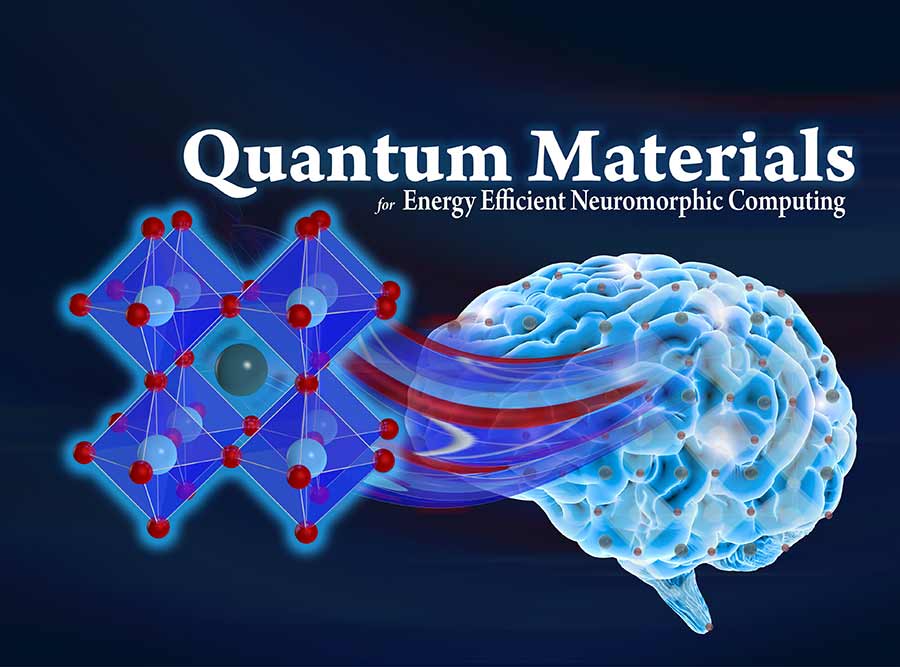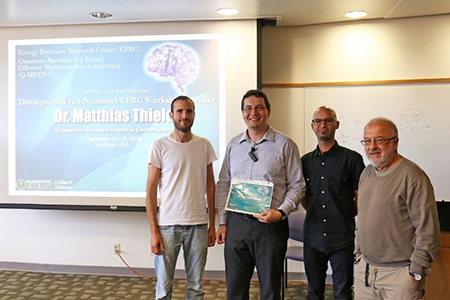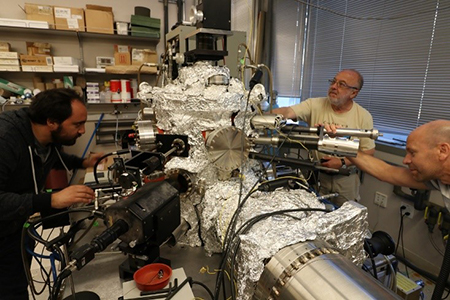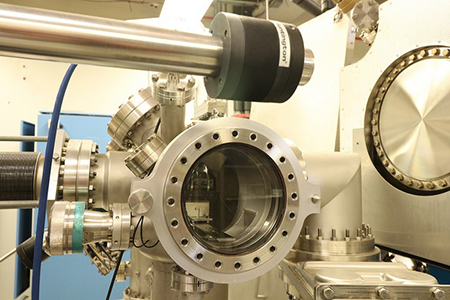By:
- Cynthia Dillon
Published Date
By:
- Cynthia Dillon
Share This:
Physicists Brainstorm World’s 21st-Century Energy Challenges
Team of international scientists led by UC San Diego is working to devise computing hardware capable of functioning as effectively as the human brain

Graphic depicting the goal of Q-MEEN-C: to discover a new energy-efficient platform for neurocomputing based on quantum materials. Image courtesy of Ivan Schuller and Alex Frano
A toddler’s ability to identify a favorite toy or an adult’s recognition of familiar faces at an airport are just two small examples of the incredible, energy-efficiency of the human brain. In today’s modern world of beeps, buzzes, AI whispers and clicks, energy is a commodity in high demand. In the case of computing, the more energy-efficient our digital tools become, the more we want more of them. Yet to make today’s laptop computers and cell phones function as efficiently and effectively as a child’s brain requires a massive amount of power—on the scale of a nuclear reactor. While scientists know brain-like computing, called neurocomputing, works in theory, its power consumption remains unsustainable, which is the reason we currently don’t have brain-like computers.
It could also be why the Department of Energy (DOE) entrusted nearly $10 million to UC San Diego’s award-winning, Distinguished Professor of Physics Ivan Schuller, who is working with his condensed matter physicist colleagues Alex Frano and Oleg Shpyrko, to establish the Energy Frontier Research Center (EFRC) at the university.
EFRC Purpose

Yoav Kalchheim, postdoctoral scholar in the Schuller group; Matthias Thiele, distinguished von Neumann speaker who presented at the inaugural workshop; Alex Frano, assistant director of Q-MEEN-C and Ivan Schuller, director of Q-MEEN-C. Photo by Michelle Fredricks
With a mission to conduct basic research to create a new, energy-efficient platform for neuromorphic computing using quantum materials, the EFRC on campus is part of a network of 40 centers nationwide. Supported by DOE’s Office of Science, these centers bring together researchers from multiple disciplines and institutions to form synergistic, highly productive teams who harness the most basic and advanced discovery research aimed at establishing the scientific foundation for a fundamentally new U.S. energy economy.
“The centers are aimed at achieving the EFRC mission with fundamental research focused on one or more ‘grand challenges’ and use-inspired basic research needs identified in major strategic planning efforts by the scientific community,” stated the DOE in a press release. “The centers integrate the talents and expertise of leading scientists in a setting designed to accelerate research toward meeting our world’s critical energy challenges.”
Q-MEEN-C
At UC San Diego, that energy challenge may have met its match with the creative enthusiasm of Schuller and Frano, a duo of self-proclaimed, would-be musicians who each opted for an “easier” career in physics. Their passionate energy for contributing to the development of neurocomputing is apparent in their orchestration of the EFRC—from the nearly 300-page proposal to the DOE, to the hosting of the center’s inaugural workshop, held within just weeks of receipt of funding. The workshop was part of a continuing series of seminars, lectures, and workshops called “Toward Neuromorphic Computation Based on Quantum Materials.”
Schuller, director of the EFRC on campus referred to as Q-MEEN-C, explained that experimenting with quantum materials—systems based on metals, oxides and organics with unusual electronic and magnetic properties—could lead to building a machine that functions like a human brain. Right now, however, quantum materials, while promising, remain mysterious.

Left to right: Postdoctoral Scholar Nicolas Vargas, Ivan Schuller and Carlos Monton demonstrate the use of a device in the Schuller Nanoscience Group lab. Photo by Michelle Fredricks
“We don’t understand them yet, which is why conducting basic research is important,” Schuller explained. “We work with international experts selected for their expertise to help achieve that understanding.”
Despite the uncertainly, Schuller admitted that what drives him to conduct the research is that moment of discovery.
“I love it when, at 9 o’clock at night, I am in the lab and realize that I am the only one in the world who knows this information right now,” he said.
Frano, EFRC assistant director, affirmed the goal of discovering a new energy-efficient platform for neurocomputing based on quantum materials.
“We have identified a class of quantum materials—similar to rust—that once we fully understand them, we can manipulate them,” he said, adding that being able to do so could lead to the scientific breakthrough needed to develop the hardware necessary for neurocomputing.
Shpyrko, noting the excitement around this area of research, also added, “The support from the university is essential for success.”
National Interest

A close-up view of a Molecular Beam Epitaxy system useful for the preparation of quantum materials in the Schuller lab.
According to the DOE press release, U.S. Secretary of Energy Rick Perry said that America’s continued energy security and global competitiveness will depend on a sustained effort in science and discovery.
“By mobilizing the talents of our nation’s top scientists and forging them into powerful, pro-active teams, the EFRC program will help ensure America’s leadership in the development of critical energy technologies and innovations,” stated Perry.
At UC San Diego our research efforts are designed to change the world for the better. The Department of Physics is among the top 20 graduate programs in the country. The first students to enroll at the university in 1960 were graduate students in physics.
Share This:
You May Also Like
Stay in the Know
Keep up with all the latest from UC San Diego. Subscribe to the newsletter today.



